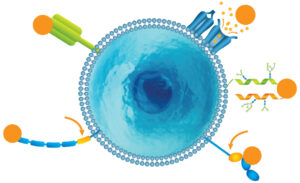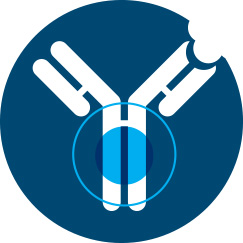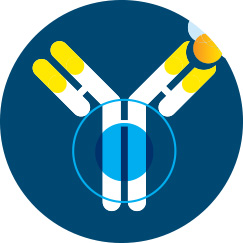We have a unique approach to developing biologics
At Visterra, we have a culture of continued platform improvements, and pride ourselves on taking a forward-looking approach to biologics design.
Target identification
Intervention at critical points in pathology

Our proprietary research technology platform is built around our HIEROTOPE® technology, which we use to identify and select the best or most promising epitopes, and design antibodies to precisely engage them. These selected epitopes are regions on a disease target that we believe play a critical role in its structure, function and/or activity, and can have the maximum therapeutic benefit when targeted. Our HIEROTOPE® platform begins with identifying disease-specific targets by leveraging single-cell multiomics data and computational analyses. This allows us to gain insights into the disease biology and mechanism of action of both the target and potential therapeutic. These efforts incorporate the use of artificial intelligence approaches to extract key signals that identify selective, novel targets that are critical nodes in a disease process. We use this biological insight, along with structure considerations and knowledge of the biology and molecular function, to identify specific epitopes which we can specifically target with antibody design platform.
Our continually evolving research platform integrates multiple technologies we use to design and engineer antibodies and antibody constructs and to develop product candidates for even the hardest-to-treat disease targets, with optimal binding, specificity, potency, half-life, scale-up and manufacturability.
Biologics Selection and Engineering
Our approach uses an effective multi-platform approach for antibody identification and engineering that is tailored to the unique characteristics of each target.
Select each target to identify its unique characteristics
Polymorphic targets with frequent mutations
(viruses, bacteria, tumors)
Targeting membrane proximal epitopes
(tumors)
Conformational changes
Limited binding surfaces
(G-protein-coupled receptors, ion channels)
Glycan cloaking
(bacteria, fungi, tumors)
Challenging mode of engagement
(protein complexes)

Rapid discovery, design, & engineering
We use single cell and library-based approaches to rapidly discover, design and engineer antibodies on an epitope-specific basis. To complement these approaches, de novo protein design approaches are applied to precisely target epitopes, leveraging the latest advancements in machine learning, bioinformatics, and structural modeling.
Engineered for optimal function
Identifying biologic lead molecules is just the beginning – we leverage innovative experimental and computational approaches to turn biologic leads into effective best-in-class therapeutics. Our biologics are engineered for optimal function, developability, and manufacturability. We know that every target is unique and has its own set of challenges, so we customize our approach for each target to ensure our therapeutics have the maximal clinical impact.
Precise control of target biology
A variety of novel antibody formats are utilized to enable precise control of the target biology, including engineering multi-specific molecules, Fc-fusion proteins, and payload-conjugates. In addition to optimizing our biologics to be highly selective and potent, our platform can incorporate our proprietary ViSTAR™ mutations, which are Fc modifications that can be introduced to enhance the activity of lead candidates, modify half-life, and modulate effector function.
Located in the greater Cambridge/Boston area, we are an active part of the area’s vibrant research ecosystem, with multiple partnerships and productive collaborations with leading local universities, consortia, and hospitals.







